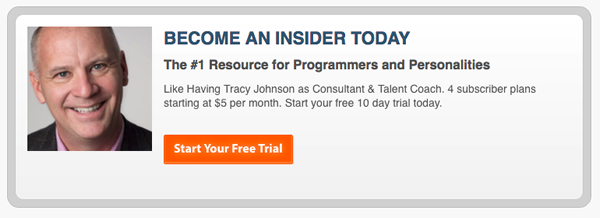How to overcome bad habits and crutches on air

Okay, so this is, like, an article about, ah, all those, um, bad, uh, habits or on-air crutches that Dj’s pick up, you know. Know what I mean? Fix these things and, like, you can be super-better at your, um, job and stuff. You know? Whatever.
All air personalities develop crutches. It may be repeating certain phrases (‘How you doin’ on a Thursday?”), running thoughts and sentences together or even just saying, “uh” or “um” all the time. Inserting “filler” words into conversation slows the pace and gets in the way of communication.
Those filler words happen when searching for the right phrase or waiting for the mouth to catch up with our thoughts. Soon they become ingrained and we don’t even hear them. It becomes a bad habit.
And it’s a barrier for the listener. In fact, at times it can get so annoying she may hear nothing else.
On-Air Crutches: Everyone Has Them
I guarantee that if you’re on the air, you have a crutch or two. You may know about it, or maybe not. Most of the time someone needs to point it out to you.
It’s a huge problem for most broadcasters. Kevin Olmstead, who became famous for winning over $2 million winner on Who Wants to Be a Millionaire, points out that breaking up a statement with fillers causes a loss in confidence from your audience.
For example, read the following lines and compare how they sound:
We’re going to hunt down terrorists and bring them to justice, dead or alive!
And:
We’re going to, ah, hunt down terrorists, and, um, bring them to justice, uh, dead or alive.
Now imagine the President saying it at a nationwide address designed to inspire confidence in the administration. The first line sounds bold, powerful and focused. The second demonstrates less confidence, doesn’t it? It sounds tentative and lacks conviction.
Throw Away Those Crutches
It’s possible to overcome bad habits. First, you have to know they exist. Kim Welter, a member of Toastmasters and a former English teacher says,
We seldom listen to ourselves, so we don’t know what the pattern might be,
That’s especially true for air personalities. Most dread air check meetings, and many rarely listen to their own show. This is where a talent coach can help. If that’s not a possibility, start a new habit to air check yourself and pay specific attention to little things that stand out as crutches.
Once they’re identified, go to work to overcome the bad habit by starting new ones.
Here’s how:
Change Your Posture
Changing the position in front of the microphone can make a big difference. If you normally sit down to perform, stand up. If you typically lean back, lean forward.
Changing little things can get you out of a comfort zone and sharpen performance because it forces the brain to be more alert.
Many bad habits start because of repetition. It’s becomes easy to perform a decent break and personalities fall into a comfortable performance. It’s like being on autopilot. Changing your posture may be all it takes to start new good habits.
Slow Down & Relax
Here’s an easy thing to improve: Relax and slow down.
This will also improve vocal qualities. The fastest talker is not a powerful force. Filling each microsecond doesn’t win the biggest prize.
Practice delivering content with a relaxed, powerful conversation, both on and off the air. Replacing crutches with silence will help you gather your thoughts and allow your voice to catch up with your brain (or vice-versa).
Speak as slowly as needed in order to maintain a thought without the crutch. As you improve, pick up the tempo. But remember that momentum is more about keeping the break moving forward, not talking faster.
Pause Between Thoughts
Most crutches are defence mechanisms air personalities develop to fill time. One of the first lessons in radio is that dead air is a horrible sin and you wouldn’t get to the promised land of ratings paradise unless every second is full of sound.
It’s not true.
You actually don’t have to keep making noise in order to keep listener attention.
“Uh and um” occur when personalities feel (usually subconsciously) that they have to keep talking. But pausing between sentences can actually add drama and impact to a presentation.
Pausing is an effective way to break the habit of using the same words over and over. Focus on the one word that is a crutch, and every time you start to say it, pause briefly. Collect your thoughts and move on without the word. This feels awkward at first, but it will help break the habit.
It’s natural to try and fill all dead space. But it’s not awkward to the listener. It’s perfectly normal.
Prepare Better
Performing spontaneously is important, but too many personalities take that to an extreme. Plan the structure of each break and visualize the break before trying to say it.
If that doesn’t help, prep deeper. Create bullet points or a storyboard to prompt you. If that still doesn’t work, script breaks until the habit is broken. There’s no shame in writing everything word for word. Tom Hanks has all of his lines scripted. Some personalities actually sound more causal and spontaneous when reading from a script.
If that doesn’t work, voice-track until the crutch disappears. Force yourself to re-perform each break until you nail it – without the crutch.
Work on Body Language
Sometimes habits recur when personalities perform with their head down, their eyes closed or staring straight ahead at the microphone. Stop this practice. If on a multi-personality show, make eye contact with cohosts. If you are a solo show and don’t have a cohost, fake it. I know some personalities that have mannequins (and one has a blow up doll) in the studio. They feel more natural when there’s someone to talk to.
If that feels weird, tune a television to a channel with talking heads, and make eye contact with them or mount a poster on the wall. Speaking directly and making eye contact helps eliminate distractions.
Focus
Breaks often get off track when personalities try to do too many things at once. Chances are, this is the biggest problem. Even if the break is well prepared, most air personalities don’t pay attention until a few seconds before the mic goes on.
Stop trying to multitask and focus on the next break. It will make a huge difference.
Be in the moment. If you’re thinking about the next segment, the next song, the next element…or worse, texting a friend…habits will be very hard to overcome. And they may become worse.
Conclusion
It takes discipline and attention to detail to get rid of bad habits, but you can do it! The result: You’ll come off as more confident, more prepared and more credible. You’ll also be more interesting.
Tracy Johnson specializes in radio talent coaching, radio consulting for programming and promotions and developing digital strategies for brands.



